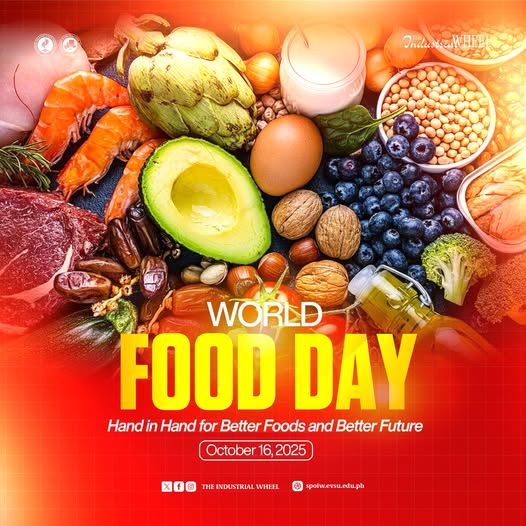The Abia State Government, in collaboration with the Ministry of Agriculture, joined the global community to celebrate the 2025 World Food Day with the theme “Hand in Hand for Better Food and a Better Future.”
The colourful event, held recently at the International Conference Centre, Umuahia, brought together eminent personalities from across the state. In attendance were the Chief Host and Governor of Abia State, His Excellency, Dr. Alex Chioma Otti, OFR, represented by the Secretary to the State Government, Prof. Kenneth Kalu, Mr. Benson Ojiekere; the Head of Service, Prince Christian Enweremadu; Special Adviser to the Governor on Agriculture; the Host and Honourable Commissioner for Agriculture, Dr. Cliff Agbaeze; Prof. Chiedozie Egesi; Executive Director, National Root Crops Research Institute (NRCRI), Umudike, Dr. Mrs. Tessy Ugo Madu, Director Planning, Monitoring and Evaluation, National Root Crops Research Institute, Umudike.
Also in attendance were commissioners, permanent secretaries, traditional rulers led by HRM Eze Uwakwe Ukaegbu, Deputy Chairman, Abia State Council of Traditional Rulers; various farmers’ groups, and other distinguished guests.
World Food Day, observed annually on October 16, is dedicated to raising global awareness about hunger, food security, and the fundamental right of every individual to nutritious food. This year’s celebration emphasized resilience, partnership, and sustainable agricultural practices as key pathways toward ending hunger and promoting a better future.
In his address, Governor Otti, represented by the SSG, reaffirmed his administration’s commitment to repositioning the agricultural sector as a cornerstone of Abia’s economy. He stated that the government is deliberate in its efforts to promote agricultural productivity and food sufficiency, pledging continued investment and partnership with stakeholders to revamp the sector.
The Honourable Commissioner for Agriculture, Dr. Cliff Agbaeze, described the year’s theme as a call to action—not only on achieving “No Poverty” and “Zero Hunger,” but also on reducing inequality through sustainable consumption and production.
“Sustainable production means doing more and better with less,” he said.
Dr. Agbaeze highlighted the state’s strategic reforms, including the establishment of the Abia State Agricultural Dynamic Database System (Abia ADDS)—a data-driven platform for government interventions, accurate distribution of fertilizers and farm equipment, and prevention of waste or diversion. He added that modern machinery has been made available to farmers, and the school feeding programme has been expanded to incorporate locally sourced produce, linking nutrition with education.
He further emphasized the government’s resolve to tackle unemployment through agriculture, noting that “where agriculture works, everybody eats, everybody earns, and nobody is left behind.”
Delivering the keynote address titled “Hand in Hand with Farmers: Building Resilient Food Systems in Abia State,” Dr. Mrs. Tessy Ugo Madu, Director, Planning, Monitoring, and Evaluation at NRCRI, Umudike, identified the key challenges confronting farmers as rising input costs, limited market access, and the effects of climate change.
She proposed three strategic priorities for progress: strengthening market access through better infrastructure and small-scale processing; expanding access to finance via cooperatives and inclusive financing models; and investing in people—especially women and youth—through training, mentorship, and agribusiness incubation.
Speaking on another keynote topic titled “Food for All: Breaking Down Barriers to Food Access and Security,” Prince Christian Enweremadu, the special Adviser to the Government on Agriculture, described food as “the most powerful necessity of life.”
“Food is not a privilege or a luxury—it is a right,” he declared. “Without food, health declines, knowledge stops, and peace becomes fragile.
Prince Enweremadu underscored the link between food security, national stability, and human development, lamenting that many Nigerians still go hungry due to insecurity, climate shocks, and poor agricultural investment. He called for urgent action to reverse the trend, describing the fight against hunger as a moral duty.
He further emphasized that organic farming is the future of agriculture, asserting that “healthy soil produces healthy crops, healthy crops nourish healthy bodies, and healthy people build a prosperous nation.”
Highlighting the Otti administration’s achievements in agricultural development, he cited the successful training of 302 farmers under the CSS Global Integrated Farmers Training Programme, with 298 farmers empowered through financial and technical support. He also mentioned the pilot rice farm project, designed to reduce import dependence and create employment opportunities for youths and women.
Additionally, the state has introduced the Farmers’ Support Programme and Input Distribution Initiative, providing high-quality seedlings to local farmers. The Abia Agricultural Dynamic Database System (ADDS), he noted, is a high-tech platform for digitally registering and supporting farmers, enabling better policy planning, financial inclusion, and resource management.
The 2025 World Food Day celebration in Abia State was not just a commemoration but a reaffirmation of the government’s resolve to ensure that no Abian goes hungry. The event closed with a renewed pledge from all stakeholders to work hand in hand for better food and a better future. Exhibitions were made by farmers.
By Ihuoma Egbeogu
























